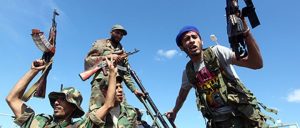Libya’s U.N.-backed government has appealed for “urgent intervention” from the international community to prevent civil war as armed forces from Libya’s main rivals battle for control of a key airbase, like reported by upi.com.
Libya’s security situation has not been helped by lack of progress in mediation efforts by the country’s neighbors while tensions over North Korea and the war in Syria have drawn U.S. attention away from Libya, political analysts said. That could lead to Russia attempting to replicate its Syrian intervention in Libya, they said.
Clashes erupted April 12 after Field Marshal Khalifa Haftar, who heads eastern Libyan factions but has national ambitions, attacked militias loyal to the U.N.-brokered Government of National Accord to capture the Tamenhant airbase.
The airbase is near Sabha, which is a front line between Haftar’s National Libyan Army and his allies and the GNA’s loose alliance of forces that include the powerful Misrata militias.
“This sudden and unjustified escalation… puts the country on the brink of civil war,” GNA Prime Minister Fayez al-Sarraj said in an open letter to international organizsations, including the United Nations, the European Union and the Arab League.
Sarraj pleaded for “urgent intervention from the international community to end the deterioration of the situation in southern Libya.”
The call has proven controversial in Libya, helping Haftar consolidate his political base, especially in the east.
Libyans have been wary of foreign intervention since the 2011 NATO-backed uprising that ousted long-time dictator Moammar Gadhafi, leaving the country without a central government and in the hands of militias and authorities vying for control of the oil-rich North African country.
Algerian security analyst Zine Cherfaoui said: “At a time when the world has eyes on the risks of global wars in Syria and North Korea, Libya is slipping gradually into civil war after the failure of the international community to reconcile rival camps in Tripoli and eastern Tobruk.”
“Both camps see the front-line base as crucial for their strategies to take the battles further to control Tripoli and seize main oil fields and export terminals in the east,” said Cherfaoui.
“Military experts interpret the efforts by Haftar to take control of Tamenhant as part of military maneuvering to later besiege Tripoli and defeat the GNA there,” said Khider Cherif, an Algerian security expert in Libya.
Libyan military analyst Milad el-Mzoughi said Haftar’s forces moved to take over the Tamenhant airbase to “neutralize militias loyal to the GNA and clear their threats to seize again the oil terminals in the east.”
Mzoughi argued that, if Haftar controlled the base, it would help his allies in the neighboring region of Fezzan.
“Fezzan region is politically linked to Tripoli, which is why the GNA had pushed all its forces to defend the Tamenhant and Jufra bases. If the GNA loses the two bases it loses control of the south,” he said.
The GNA, which was established following a U.N.-brokered agreement in late 2015, has been unable to assert its authority across Libya.
GNA Defense Ministry spokesman Mohamed al-Ghasri said the GNA requested the international community to establish a no-fly zone in the south.
Ghasri was the commander of the Misrata militias aligned with the GNA during their battle to uproot Islamic State fighters from Sirte last year. During the four-month battle, the United States conducted airstrikes, British intelligence provided logistics support and Italy stepped in with medical assistance.
The city was left in rubble, with most IS fighters scattering into other regions, including Tripoli, Ghasri said.
The turmoil in Sirte is frequently cited as a reason to reject foreign intervention but analysts said there were no signs of foreign military intervention and that hopes for successful mediation in the conflict by Libya’s neighbors were growing dimmer, amplifying the risk of civil war spreading from the front line near Tamenhant.
“European powers could be the ones leaning toward an intervention in Libya, not the United States, because of the pressures to defend European interests in Libya,” said Libyan political analyst Khaled al- Gerboui.
The Tobruk-based parliament rejected the call for international military intervention, describing it as a violation of Libyan sovereignty.
Sarraj’s call was also the source of concern among Libya’s neighbors.
“Is Sarraj blind to the dangers his call represents for Libya and its neighbors?” asked Algerian daily L’Expression, which is close to the Algerian presidency. “No one, whether Libya or its neighbors, would be served by military adventure replacing the option of political dialogue.”



